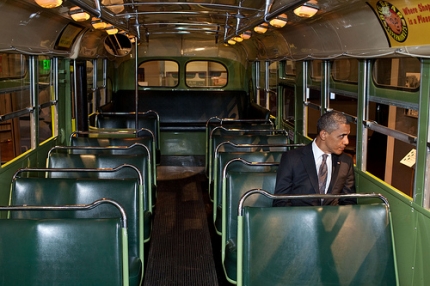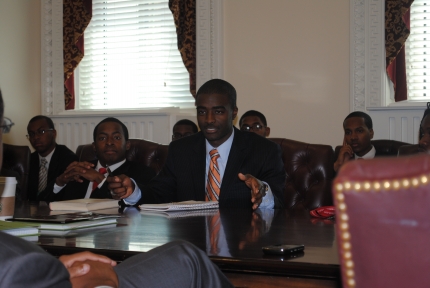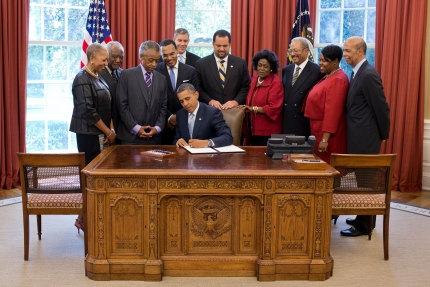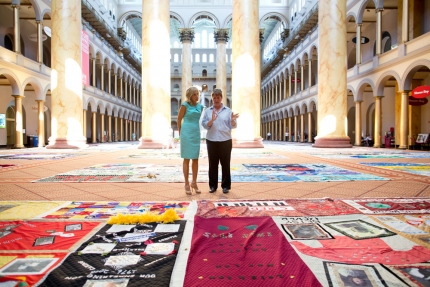Blog Posts Related to the African American Community
Addressing HIV in the Black Community
Posted by on February 8, 2013 at 3:45 PM ESTEd. note: This was cross-posted from The Root.
Yesterday, on Black HIV/AIDS Awareness Day, I had the pleasure of meeting with leaders who are doing outstanding work to prevent new HIV infections and improve health outcomes for African-Americans. We shared stories and discussed the importance of engaging everyone in these efforts, including faith leaders, educators, athletes, entertainers, artists, scientists, healthcare providers as well as friends, families, and neighbors.
This approach also reflects the National HIV/AIDS Strategy, which calls for a collective response to the ongoing domestic epidemic, and sets specific goals with regard to addressing HIV-related disparities among African-Americans.
Our conversation was both sobering and inspiring. Sobering because of the challenges that remain in addressing the epidemic, including confronting the myths about HIV transmission and the virus itself. Inspiring because during our dialogue it became clear that these leaders are committed to breaking down barriers that impede our progress in preventing and treating HIV/AIDS.
Data highlight the urgency of this work. According to the Centers for Disease Control and Prevention, 1.1 million people in the United States are living with HIV/AIDS and nearly 50,000 people become infected with HIV each year. In 2010, African-Americans accounted for only 14% of the U.S. population, but 44% of new HIV infections. The majority (70%) of new HIV infections among African-Americans occur among black men, and are concentrated among gay men. In fact, young black gay and bisexual men who are the only group in the black community where new HIV infections are increasing. Black women represent 30% of new infections among African-Americans. Transgender black women are also at risk for HIV with as many as one in three in some studies diagnosed with HIV. And only 21% of black Americans have a suppressed viral load, the key health marker for HIV treatment.
Learn more aboutHonoring Rosa Parks on the 100th Anniversary of her Birth
Posted by on February 4, 2013 at 6:04 PM ESTRosa Louise McCauley Parks was born on February 4, 1913. Her life inspired millions of people and challenged the conscience of our Nation. Her refusal to give up her seat on a bus on December 1, 1955, inspired a civil rights movement that led to the passage of the Civil Rights Act on July 2, 1964. “When I made that decision," she later said, “I knew that I had the strength of my ancestors with me."
We stand on the shoulders of Rosa Parks, and so many other leaders who struggled and worked to ensure our country’s founding principles of life, liberty, and the pursuit of happiness are achievable for everyone.

President Barack Obama sits on the famed Rosa Parks bus at the Henry Ford Museum following an event in Dearborn, Michigan. April 18, 2012. (Official White House Photo by Pete Souza)
Learn more about Civil Rights, WomenAfrican American History Month: Celebrating Two Landmark Anniversaries in American History
Posted by on February 1, 2013 at 11:45 AM ESTEvery February, we celebrate and reflect on the great contributions African-Americans have made to our country. This year, African American History Month celebrates two landmark anniversaries in American history, with the theme, “At the Crossroads of Freedom and Equality: The Emancipation Proclamation and the March on Washington.”
On January 1st, we observed the 150th anniversary of the Emancipation Proclamation, and this August will mark 50 years since the 1963 March on Washington and Dr. Martin Luther King Jr.’s ‘I Have a Dream’ speech. We will spend the month of February highlighting these monumental moments and honoring the causes of freedom and equality that inspired them.
In 1863, the Emancipation Proclamation was issued by President Abraham Lincoln, adding momentum to signal the beginning of the end of slavery in America. One hundred years later, Americans from all corners of the country, representing every race and religion, came together under the leadership of Dr. Martin Luther King Jr. to peacefully march through the streets of our capital and call for equality under the law for all citizens.
Learn more about Civil RightsYoung Men from The Institute for Responsible Citizenship Visit the White House
Posted by on July 31, 2012 at 11:52 AM ESTLast week I had the privilege of spending an hour with twenty accomplished young men from the Institute for Responsible Citizenship (I4RC). I4RC is a competitive two-year program that prepares high-achieving African-American men from across the country to reach their career and character potential. These young men took a break from their summer internships in Washington, DC to meet with myself and other African-American White House staffers.
President Obama Creates Initiative to Improve Educational Outcomes for African Americans
Posted by on July 26, 2012 at 4:14 PM ESTOn Wednesday, during his remarks at the National Urban League conference in New Orleans, President Obama announced an Executive Order to improve outcomes and advance educational opportunities for African Americans. On Thursday, he signed that Executive Order surrounded by some of the key leaders who have been at forefront of promoting those priorities.
The President has made it a top priority to provide a complete and competitive education for all Americans – from cradle to career. The White House Initiative on Educational Excellence for African Americans, created by this Executive Order, will work across Federal agencies and with partners and communities nationwide to produce a more effective continuum of education programs for African American students. The initiative aims to ensure that all African American students receive an education that fully prepares them for high school graduation, college completion, and productive careers.
In the nearly 60 years since the Brown v.Board of Education decision put America on a path toward equal educational opportunity, America’s educational system has undergone a remarkable transformation. Many African American children who attended substandard, segregated schools in the 1950s have grown up to see their children attend integrated and effective elementary and secondary schools, colleges, and universities. Nonetheless, substantial obstacles to equal educational opportunity still remain in America’s school systems. Disproportionately, students of color, including African Americans, lag in equal access to highly effective teachers and principals, safe schools, and challenging college-preparatory classes. And they experience school discipline and referrals to special education at higher rates than their peers.
Improving the educational outcomes of African Americans will provide substantial benefits for our country, like increasing college completion rates, employment rates, and the number of African American teachers. So, through this Executive Order, President Obama is taking an important step to promote a more promising future for all Americans.
For more on the Initiative, please click here.
Valerie Jarrett is a Senior Advisor to President Obama.
Learn more about EducationDr. Jill Biden Views the AIDS Memorial Quilt
Posted by on July 26, 2012 at 10:40 AM ESTYesterday, I had the opportunity to view some panels of the AIDS Memorial Quilt with Julie Rhoad, the president and CEO of The Names Project Foundation, at The National Building Museum.
I was so moved by what I saw. Every piece of the AIDS Memorial Quilt tells a poignant story – and is a powerful reminder of the many lives lost to this epidemic
First displayed on the National Mall in 1987, the quilt now contains the names of more than 94,000 of individuals who have died of AIDS on more than 47,000 panels.
This week, as the 19th International AIDS Conference is in the United States for the first time since 1990, panels of the quilt have been shown on the Mall and at more than 50 locations throughout the D.C. area.
The quilt is a powerful reminder of how far we have come. As President Obama said on World AIDS Day, we will win this fight.
Learn more about , Additional Issues
- &lsaquo previous
- …
- 12
- 13
- 14
- 15
- 16
- 17
- 18
- 19
- 20
- …
- next &rsaquo


